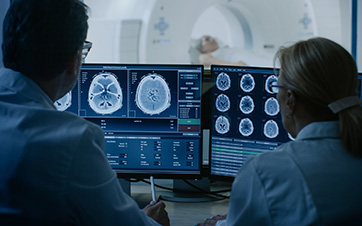
The choice between a CT scan and an MRI for a brain tumor may be out of your hands, but understanding their differences is pivotal to preparing yourself. Let's delve into the nuances of these medical marvels to ensure you're equipped when it does come time for your diagnosis.
MRI vs CT Scan: What's the Difference?
Brain tumor diagnosis is a critical step in a patient's journey, but you wouldn't be blamed for being confused by the difference between the two primary diagnostic tools. Here are some of the key differences between an MRI and a CT scan:
Understanding the MRI Scan
Magnetic Resonance Imaging, commonly known as MRI, uses magnetic fields and radio waves to produce detailed images of the brain. When considering an MRI for a brain tumor, it's noteworthy that:
- MRI offers a clearer view of soft tissues, making it easier to differentiate between healthy and affected regions
- There's no exposure to radiation, as opposed to X-ray-based tests
- MRI scans are louder and can take longer than CT scans, often requiring the patient to lie still for an extended period
Delving into the CT Scan
A CT scan, or Computed Tomography scan, uses X-rays to create cross-sectional images of the brain. When discussing the CT scan for brain tumor detection, a few things stand out:
- CT scans are faster than MRI scans and often completed within minutes
- They provide a good view of the overall structure, especially when assessing bone damage or bleeding
- Patients are exposed to a small amount of radiation during the procedure
Advantages of MRI for a Brain Tumor
MRI scans stand out as a pivotal tool in the field of brain tumor diagnosis and detection. Their unique attributes offer a range of advantages. They ensure that medical practitioners and patients have a comprehensive view of the brain's status.
Unparalleled Soft Tissue Imaging
One of the most compelling advantages of an MRI scan is its ability to capture high-resolution images of soft tissues. This is crucial for brain tumor diagnosis. Distinguishing between tumors, fluids, and healthy tissues can mean the difference between early detection and late diagnosis.
No Radiation Exposure
The absence of radiation in MRI scans offers a safer alternative, especially for patients who require multiple scans. This ensures that patients, particularly children or those with heightened sensitivities, can undergo the procedure without the added risk of radiation.
Detailed Layer-by-Layer Analysis
MRI scans provide a three-dimensional view of the brain. They allow doctors to analyze the tumor's size, shape, and location with precision. This depth of detail aids in understanding the tumor's nature, be it benign or malignant.
Higher Contrast Resolution
Brain tumors can often be nestled amidst critical brain structures. The MRI's high contrast resolution allows for a sharper differentiation between various tissues. This makes it easier to pinpoint and assess tumors, even those that might be elusive on other scans.
Flexibility in Imaging
With MRI, doctors can acquire images in any plane, whether it's horizontal, vertical, or oblique. This flexibility ensures a holistic view of the tumor. It aids in more accurate diagnosis and subsequent treatment planning.
Advantages of CT Scan for Brain Tumor Diagnosis
Navigating the landscape of brain tumor diagnosis requires a thorough understanding of available tools. The CT scan stands as a valuable asset in this process and brings with it a suite of benefits tailored for efficient brain tumor detection.
Speed and Efficiency
When time is of the essence, CT scans rise to the occasion. They're fast, often completed within mere minutes. This speed ensures that medical teams can swiftly move to analyze the results and plan subsequent steps in the patient's care.
Clear View of Structural Details
Beyond merely detecting tumors, CT scans excel in showcasing the broader structural details of the brain. They are particularly adept at revealing:
- Bone damage
- Potential bleeding
- Any swelling that might accompany a tumor
Minimal Procedure Requirements
Unlike some other imaging methods, CT scans don't require the patient to be in the machine for an extended time. The shorter duration helps reduce potential discomfort or anxiety, and this makes the process smoother for patients.
Preparing for a Brain Tumor Scan
Preparing for a brain tumor scan is an essential step for patients. While the exact preparations may vary based on the specific test, some general guidelines can help individuals gear up for their scheduled tests for brain tumor diagnosis.
Avoid Certain Foods and Medications
Often, doctors recommend that patients avoid eating or drinking anything a few hours before the scan. This ensures that the imaging results aren't obscured by any food particles or recent intake. Additionally, it's crucial to inform the medical team of any medications being taken, as some might interfere with the scan results.
Be Ready to Discuss Medical History
While the focus is on brain tumor detection, it's essential to provide the medical team with a comprehensive overview of one's health history. Past surgeries, allergies, or any conditions can influence the scan procedure and interpretation.
Choose Comfortable Clothing
It might sound trivial, but wearing comfortable, loose-fitting clothing can make the experience less stressful. Metal objects, including zippers and buttons, can interfere with some scans, so it's wise to opt for clothing free from such elements.
Be Open About Concerns and Fears
For many, the idea of undergoing a scan, especially if it's their first time, can be anxiety-inducing. It's okay to discuss these fears with the medical team. They're trained to provide reassurance and might offer tips or techniques to stay calm during the procedure.
Empower Your Fight Against Brain Tumors
Every decision made regarding brain tumor detection can profoundly influence the journey ahead. Whether your doctor is leaning towards an MRI for a brain tumor or a CT scan, understanding their nuances is vital.
As the Connecticut Brain Tumor Alliance, our unwavering commitment is to provide hope, support, and advanced research to enhance quality care. By staying informed and proactive, you're not only supporting patients but also backing endeavors that aim to illuminate a brighter future for all affected. Support our mission and donate today.
Disclaimer
All content and information on this website is for informational and educational purposes only and nothing herein shall be construed as medical advice. Always consult your medical provider for your particular needs and circumstances prior to making any medical decisions.

